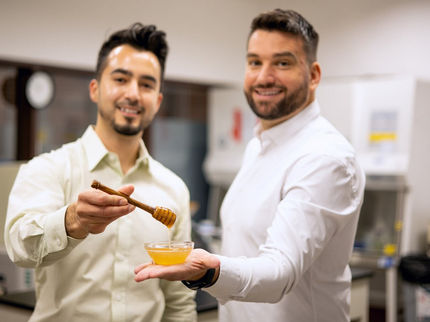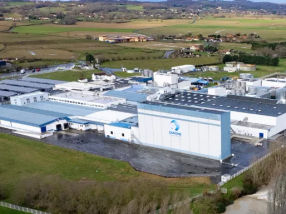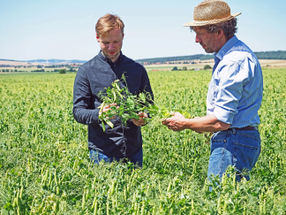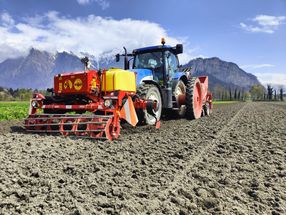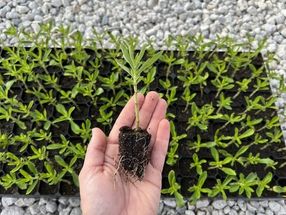Mainstreaming biodiversity in tropical supply chain is possible - methods and measures presented
Efficient criteria in food standards and practical methods for effective measures in agriculture are cited as success factors.
For about four and a half years, experts of the Gesellschaft für Internationale Zusammenarbeit GIZ, the Global Nature Fund (GNF) and the Lake Constance Foundation have developed and tested effective approaches to integrate biodiversity measures on the plantations, using the example of bananas and pineapples from Costa Rica and the Dominican Republic. The results were presented at a conference in Frankfurt together with around eighty representatives of the industry.
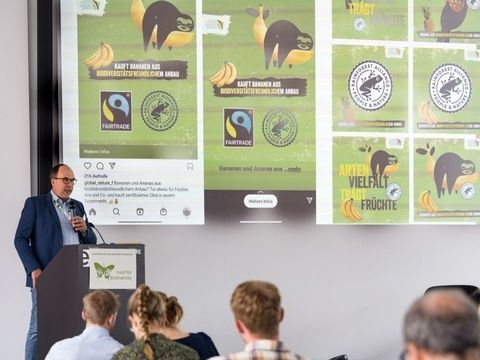
Dr. Thomas Schaefer presents the project "Del Campo al Plato
© MartinKaemper.de / Food for Biodiversity
Efficient biodiversity criteria in existing sustainability standards in the food industry were identified as the most successful measure. Standards such as Rainforest Alliance, Fairtrade and Sustainably Grown in conventional, Naturland and Demeter in organic farming now have comprehensive criteria that effectively address biodiversity protection. "With up to 90% certified goods in bananas and probably well over 50% in pineapples, we can justifiably speak of mainstreaming" says Thomas Schaefer, head of conservation and coordinator of the project at GNF. The new standard of Naturland, presented by Eva Kohlschmidt, shows how extensive these criteria can be. In addition to a ban on deforestation since the year 2000, cultivation in agroforestry is obligatory in many tropical permanent crops.
Equally successful and concrete in its implementation is the Biodiversity Check Agricola (BCA), which has so far been carried out by more than 150 farms that are now implementing a Biodiversity Action Plan (BAP). Around 45,000 hectares of land - about as much as we need to grow the bananas and pineapples consumed in Germany - are gradually being developed, or managed, in a more biodiversity-friendly way. "The BCA has proven to be a pragmatic and practical method for large plantations as well as for smallholder cooperatives" explain Marion Hammerl, Senior Expert of the Lake Constance Foundation and initiator of the Del Campo al Plato project.
The landscape approach that Campo al Plato and other projects are now pursuing is also promising. Ralf Buß, project officer at GIZ in Ecuador presented two initiatives with indigenous groups in Colombia and Ecuador, where by integrating measures for biodiversity into traditional farming systems, they also work against degradation and biodiversity loss across products, rather than working with individual plantations on a project-by-project basis. Biotope corridors in Costa Rica and the Domincan Republic, in whose implementation companies along the value chain for banana and pineapple invest, follow the same approach.
Regulatory approaches such as the EU Deforestation Regulation and the EU Supply Chain Act create a level playing field for all companies. This improves market opportunities for companies that are already implementing sustainability measures and have been at a competitive disadvantage so far, as the cost of products is often higher. This was explained by Franziska Rau, deforestation freedom advisor at GIZ. At the same time, they pose major implementation challenges for producing companies in countries of the global South. The distribution of compliance costs along supply chains has not yet been sufficiently clarified. Martin Schüller, Development Policy, Climate & Environment Officer at Fairtrade, emphasized that these costs cannot be borne by smallholder farmers alone.
Also still unresolved is the interaction between supply and pricing in food retailing and consumer demand for sustainable - biodiversity-friendly - products. Surveys confirm the growing willingness of customers to contribute to the costs of sustainable production. Especially in the conventional market segment, this willingness is not yet sufficiently utilized by food retailers to enable adequate prices for producers that cover the costs and added value of a product that has been cultivated in a biodiversity-friendly way.
Overall, the initiators of the project draw a positive balance. The goals of the project and the associated effects were achieved - despite the difficult environment. The Biodiversity Check Agrícola and the training for managers of plantations are anchored in various organizations and will continue to be implemented. Companies can continue to participate financially in the implementation of the biotope corridors and contact the project partners.
Note: This article has been translated using a computer system without human intervention. LUMITOS offers these automatic translations to present a wider range of current news. Since this article has been translated with automatic translation, it is possible that it contains errors in vocabulary, syntax or grammar. The original article in German can be found here.
